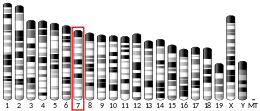CHSY1
Chondroitin sulfate synthase 1 is an enzyme that in humans is encoded by the CHSY1 gene.[5][6]
CHSY1 synthesizes chondroitin sulfate, a glycosaminoglycan expressed on the surface of most cells and in extracellular matrices. Glycosaminoglycan chains are covalently linked to a wide range of core protein families and regulate many biologic processes, including cell proliferation and recognition, extracellular matrix deposition, and morphogenesis.[7][6]
References
- 1 2 3 GRCh38: Ensembl release 89: ENSG00000131873 - Ensembl, May 2017
- 1 2 3 GRCm38: Ensembl release 89: ENSMUSG00000032640 - Ensembl, May 2017
- ↑ "Human PubMed Reference:".
- ↑ "Mouse PubMed Reference:".
- ↑ Kitagawa H, Uyama T, Sugahara K (Oct 2001). "Molecular cloning and expression of a human chondroitin synthase". J Biol Chem. 276 (42): 38721–6. doi:10.1074/jbc.M106871200. PMID 11514575.
- 1 2 "Entrez Gene: CHSY1 carbohydrate (chondroitin) synthase 1".
- ↑ supplied by OMIM
External links
- Human CHSY1 genome location and CHSY1 gene details page in the UCSC Genome Browser.
Further reading
- Otsuki T, Ota T, Nishikawa T, et al. (2007). "Signal sequence and keyword trap in silico for selection of full-length human cDNAs encoding secretion or membrane proteins from oligo-capped cDNA libraries". DNA Res. 12 (2): 117–26. doi:10.1093/dnares/12.2.117. PMID 16303743.
- Gerhard DS, Wagner L, Feingold EA, et al. (2004). "The status, quality, and expansion of the NIH full-length cDNA project: the Mammalian Gene Collection (MGC)". Genome Res. 14 (10B): 2121–7. doi:10.1101/gr.2596504. PMC 528928. PMID 15489334.
- Clark HF, Gurney AL, Abaya E, et al. (2003). "The secreted protein discovery initiative (SPDI), a large-scale effort to identify novel human secreted and transmembrane proteins: a bioinformatics assessment". Genome Res. 13 (10): 2265–70. doi:10.1101/gr.1293003. PMC 403697. PMID 12975309.
- Yada T, Sato T, Kaseyama H, et al. (2003). "Chondroitin sulfate synthase-3. Molecular cloning and characterization". J. Biol. Chem. 278 (41): 39711–25. doi:10.1074/jbc.M304421200. PMID 12907687.
- Kitagawa H, Izumikawa T, Uyama T, Sugahara K (2003). "Molecular cloning of a chondroitin polymerizing factor that cooperates with chondroitin synthase for chondroitin polymerization". J. Biol. Chem. 278 (26): 23666–71. doi:10.1074/jbc.M302493200. PMID 12716890.
- Strausberg RL, Feingold EA, Grouse LH, et al. (2003). "Generation and initial analysis of more than 15,000 full-length human and mouse cDNA sequences". Proc. Natl. Acad. Sci. U.S.A. 99 (26): 16899–903. doi:10.1073/pnas.242603899. PMC 139241. PMID 12477932.
- Nagase T, Ishikawa K, Suyama M, et al. (1999). "Prediction of the coding sequences of unidentified human genes. XIII. The complete sequences of 100 new cDNA clones from brain which code for large proteins in vitro". DNA Res. 6 (1): 63–70. doi:10.1093/dnares/6.1.63. PMID 10231032.
This article is issued from
Wikipedia.
The text is licensed under Creative Commons - Attribution - Sharealike.
Additional terms may apply for the media files.



